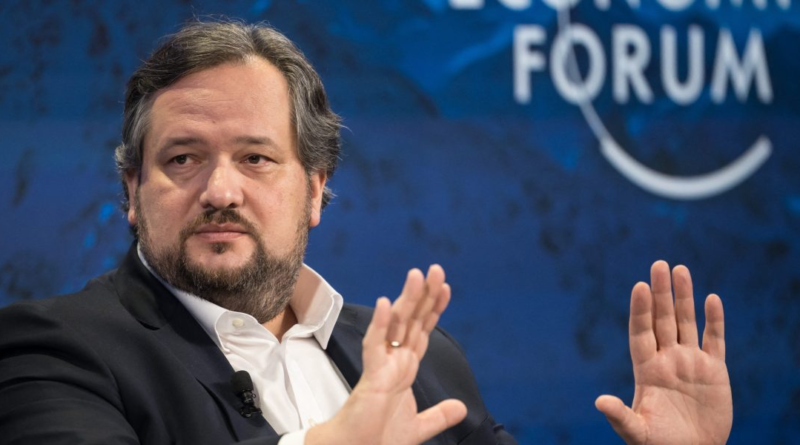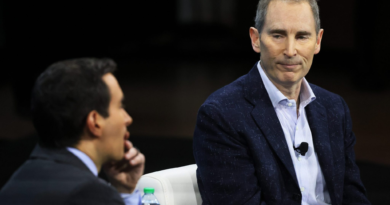Société Générale CEO Slawomir Krupa’s promise less, deliver more approach keeps investors guessing
Slawomir Krupa has had a rocky first year at Societe Generale SA.
The former investment banker was brought in to revive a firm that had trailed rivals after a series of setbacks and broken promises. Krupa’s solution was to promise less and deliver more, an approach that at times left investors and employees asking for more guidance.
Initially, Krupa’s appointment fueled optimism after the 15-year reign of Frederic Oudea. But early gains for the stock evaporated in September when the new CEO unveiled a strategic plan that prioritized efficiency and capital strength over growth. SocGen slumped 12% that day as Krupa cut targets for revenue and profitability, and guided for lower payouts to shareholders.
It has since recovered and is now up 13% over Krupa’s tenure, compared with gains of almost 20% for BNP Paribas SA over that period and well behind Deutsche Bank AG and UniCredit SpA.
“The bank’s financial communication hasn’t been the best,” said Jerome Legras, managing partner and head of research at Axiom Alternative Investments, which owns SocGen shares. Still, he’s willing to give Krupa the benefit of the doubt — for now — as his plan is “showing some progress.”
While his first year hasn’t always resonated with markets, Krupa is sticking with changes that may eventually pay off. Among the concrete steps the 49-year-old announced is a target to cut about €1.7 billion ($1.8 billion) in costs by 2026, through measures including hundreds of job reductions at the headquarters in Paris.
Krupa also put more than a dozen units up for sale. He sold SocGen’s equipment finance unit in a €1.1 billion transaction last month, and reached deals to exit several African countries. He agreed to sell the bulk of SocGen’s Moroccan business in a move that’s expected to boost a key measure of capital strength known as CET1 ratio by 15 basis points.
But progress has been uneven, and Krupa has been unwilling to update investors on his disposal plans. The lender is still exploring the sale of its custodian unit SGSS, its German consumer finance business Hanseatic Bank, as well as private banking assets in the UK and Switzerland, people familiar with the matter have said. SocGen hasn’t confirmed those plans.
More importantly, the French lender repeatedly kept investors guessing about the impact of wrong-way interest-rate hedges put in place under Krupa’s predecessor Oudea. After initially saying it expected 2023 to be a “transition year,” SocGen later guided for a 15% to 20% hit to its French net interest margin. Eventually, that became more than 20%.
“In order to turn a restructuring story into a positive one, management needs to provide clear communication on its progress and how it’s dealing with potential headwinds,” said Citigroup Inc. analyst Azzurra Guelfi. “This hasn’t been the case at SocGen, in particular when it comes to the challenges of its French net interest margin and regulation risk for capital.”
A spokesperson for SocGen declined to comment.
Last month during a call with analysts detailing first-quarter earnings, Chief Financial Officer Claire Dumas declined to provide a specific guidance on regulatory impacts on capital, which she referred to as “moving parts.” She also flagged that the continued impact of the rate hedges and changing client behavior meant that the net interest margin is at the low end of SocGen’s guidance.
The shares, which started the day up as much as 6.1%, reversed gains and were down more than 6% after the comments.
Compared to his predecessor, Krupa appears more distant to staff, say people inside the bank, who asked for anonymity because they aren’t authorized to speak to the press. In townhall meetings, where Oudea would previously take questions live, the new CEO asks for them to be submitted in advance and moderated by the communication team, the people said.
In discussions with management, Krupa is known for being demanding and at times combative, several people said. He’s also tightened control over expenses, requiring more procurement contracts be approved by his chief of staff.
Some managers have scrapped projects if they weren’t deemed profitable enough, the people said, stoking concern internally that the bank risks falling behind competitors. The focus on capital, meanwhile, has led some investment bankers to forgo new deals right before the end of a quarter, so as not to burden the balance sheet with assets before they can be sold on, one person said.
That along with disposals left SocGen with declining revenue at a time when peers across Europe report record results on the back of high interest rates. Its price-to-book ratio, at 0.32, is the lowest among peers, making a potential takeover attractive for rivals.
“Finance dealmaking is starting to pick up in Europe, and SocGen could very well be prey,” Legras said. “That being said, domestic consolidation makes more sense, and I don’t think any foreign lender could be interested in SocGen.”




